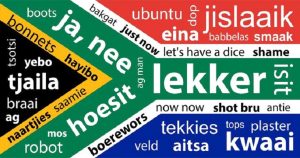Afrikaans Translation Challenges
By Sarah-Claire Jordan
 Afrikaans is not the first language we tend to think of when we think about Africa as a whole. It doesn’t even sound like the names of other African languages, and yet it is in third place in terms of most commonly-spoken languages in the country of South Africa. Zulu and Xhosa are the top two languages of South Africa, though English is also very common and used for government and media purposes.
Afrikaans is not the first language we tend to think of when we think about Africa as a whole. It doesn’t even sound like the names of other African languages, and yet it is in third place in terms of most commonly-spoken languages in the country of South Africa. Zulu and Xhosa are the top two languages of South Africa, though English is also very common and used for government and media purposes.
The language comes from an old dialect of Dutch that was brought over from Holland in the 1700s, when many Dutch settlers came to what would later become South Africa. It evolved more as it was exposed to the other languages of neighboring peoples, such as Bantu, Portuguese, and a few of the Khosian languages even. English has also had an influence on Afrikaans and vice versa, especially in terms of slang.
You might be wondering that, if English is used mostly for the media and by the government, why would Afrikaans translations be so important? Though it is a widely-used language, English has less history and cultural significance than Afrikaans. Marketing towards a demographic that speaks mostly Afrikaans might be a good idea depending on what someone is trying to sell. Afrikaans is one of the 13 official languages spoken in South Africa, and has become an important part of South African culture.
Besides that, South Africa is among the top three countries in Africa with the highest gross domestic product. In layman’s terms, this means South Africa’s economy is doing quite well compared to much of the rest of the continent. This is significant because companies wanting to branch out may start to look at South Africa with different eyes knowing that it could be a good place to start marketing towards. High tech companies in general don’t usually pay attention to South Africa, but if their economy keeps growing, they might start to look at it as a good place to do business in as well.
In order to translate content into Afrikaans, however, a local translator is needed. This means someone who is not only native in Afrikaans and experienced and certified as a translator, but also someone who lives in South Africa and knows a thing or two about the people and culture there. Afrikaans has some interesting nuances and ever-changing slang that might be lost on someone who is a native speaker but has lived abroad for a long time.
Another necessity for Afrikaans translation projects to go smoothly is to have another equally qualified and South Africa-based translator available to proofread, edit, and consult with the other translator. This may sound like only two people are really needed to handle Afrikaans translation projects, but it actually means that, within a translation company, at least two certified and experienced Afrikaans translators need to be working together in order for good results on translation projects. Any translation company that values the quality of its services over convenience would be able to hire and work with an Afrikaans translation team that remained in South Africa, and so you should look for this when looking for translation companies to work with.
Category: Foreign Language








